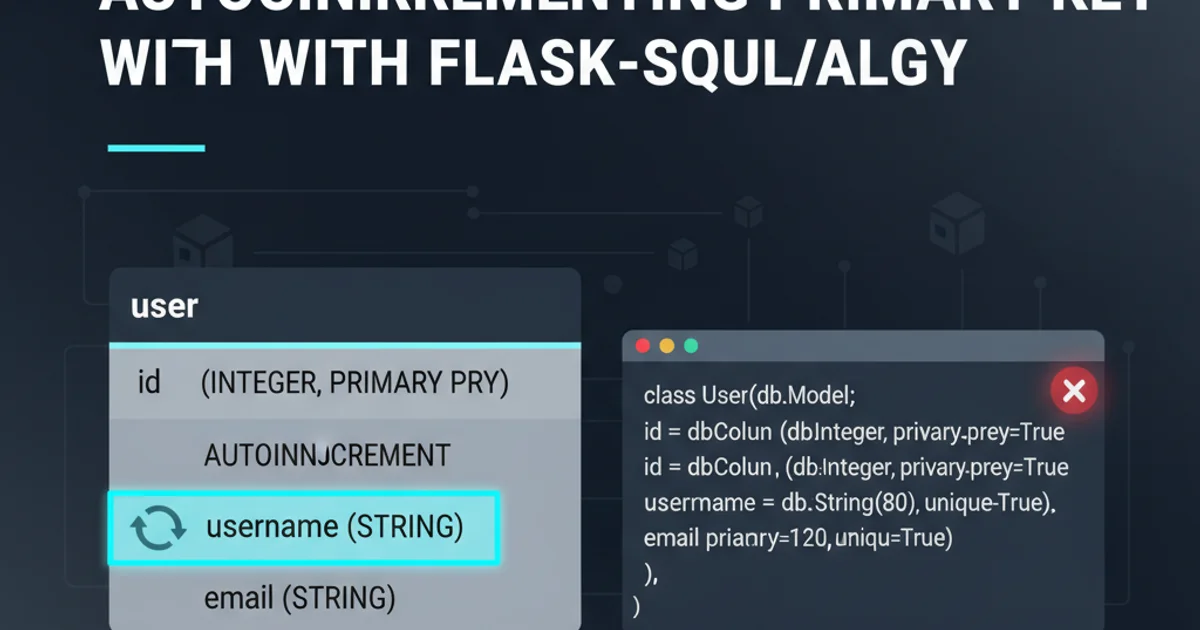unable to create autoincrementing primary key with flask-sqlalchemy
Categories:
Resolving Auto-Incrementing Primary Key Issues with Flask-SQLAlchemy and PostgreSQL

Learn how to correctly configure auto-incrementing primary keys in Flask-SQLAlchemy models for PostgreSQL, addressing common pitfalls and ensuring proper database schema generation.
When working with Flask-SQLAlchemy and PostgreSQL, developers often encounter issues with auto-incrementing primary keys. While SQLAlchemy generally handles this seamlessly, specific configurations or database interactions can lead to unexpected behavior where the primary key column does not auto-increment as intended. This article delves into the common causes of this problem and provides robust solutions to ensure your primary keys are correctly managed by the database.
Understanding Auto-Increment in PostgreSQL and SQLAlchemy
PostgreSQL handles auto-incrementing primary keys primarily through SERIAL or BIGSERIAL pseudo-types, which are syntactic sugar for creating a SEQUENCE and setting a DEFAULT value for the column. SQLAlchemy, when defining an Integer or BigInteger primary key, typically infers this behavior and sets up the column with autoincrement=True by default. However, if you explicitly specify server_default or other column properties, or if you're migrating an existing database, this automatic inference might be overridden or misconfigured.
flowchart TD
A[Define Model with Primary Key] --> B{Is `autoincrement=True` Explicitly Set?}
B -- No --> C{Is `Integer` or `BigInteger` Primary Key?}
C -- Yes (Default) --> D[SQLAlchemy Infers Auto-Increment]
C -- No --> E[Manual Sequence/Default Needed]
B -- Yes --> D
D --> F{Database Dialect (e.g., PostgreSQL)}
F --> G[Generates `SERIAL` or `IDENTITY` Column]
E --> G
G --> H[Auto-Incrementing Primary Key]Flowchart of Auto-Incrementing Primary Key Resolution
Common Pitfalls and Solutions
The most frequent reason for a primary key not auto-incrementing is an incorrect column definition or an issue with how the database sequence is managed. Let's explore these scenarios and their solutions.
from flask_sqlalchemy import SQLAlchemy
from sqlalchemy import Integer, Column
db = SQLAlchemy()
class User(db.Model):
__tablename__ = 'users'
id = Column(Integer, primary_key=True) # SQLAlchemy infers autoincrement=True
name = Column(db.String(80), unique=True, nullable=False)
class Product(db.Model):
__tablename__ = 'products'
# Explicitly setting autoincrement=True for clarity, though often default
id = Column(Integer, primary_key=True, autoincrement=True)
name = Column(db.String(120), nullable=False)
# Example of a problematic definition (if not intended for manual ID)
class Order(db.Model):
__tablename__ = 'orders'
# If you explicitly set server_default, SQLAlchemy might not manage sequence
# This is generally not needed for auto-incrementing PKs
id = Column(Integer, primary_key=True, server_default='1')
item = Column(db.String(100))
Correct and potentially problematic Flask-SQLAlchemy model definitions.
Integer primary keys in SQLAlchemy models will typically map to SERIAL (or INTEGER GENERATED BY DEFAULT AS IDENTITY in newer PostgreSQL versions) automatically, ensuring auto-increment behavior. Explicitly setting autoincrement=True is often redundant but can improve clarity.Ensuring Database Sequence Alignment
Sometimes, the issue isn't with the model definition itself, but with the underlying database sequence. This can happen if you've manually altered the table, imported data without sequence updates, or if the sequence's current value is out of sync with the maximum id in the table. PostgreSQL sequences need to be updated to reflect the highest existing id to prevent primary key conflicts and ensure new inserts get the next available value.
-- Check the current value of the sequence for a table
SELECT pg_get_serial_sequence('your_table_name', 'id');
-- Example: Get the next value from the sequence
SELECT nextval('your_table_name_id_seq');
-- Reset the sequence to the maximum ID in the table + 1
SELECT setval('your_table_name_id_seq', (SELECT MAX(id) FROM your_table_name));
-- Or, if you want to ensure it's at least MAX(id) + 1, even if MAX(id) is NULL
SELECT setval('your_table_name_id_seq', COALESCE((SELECT MAX(id) FROM your_table_name), 0) + 1, false);
SQL commands to inspect and reset PostgreSQL sequences.
Using Identity Columns (PostgreSQL 10+)
PostgreSQL 10 introduced IDENTITY columns, which are the SQL standard way to define auto-incrementing columns, replacing the SERIAL pseudo-type. SQLAlchemy supports this through sqlalchemy.Identity. While SERIAL still works, IDENTITY offers more control and better aligns with SQL standards. If you're using a modern PostgreSQL version, consider using Identity for new tables.
from flask_sqlalchemy import SQLAlchemy
from sqlalchemy import Integer, Column, Identity
db = SQLAlchemy()
class NewUser(db.Model):
__tablename__ = 'new_users'
# Using Identity for PostgreSQL 10+ for standard-compliant auto-increment
id = Column(Integer, Identity(), primary_key=True)
name = Column(db.String(80), unique=True, nullable=False)
Defining an auto-incrementing primary key using Identity for PostgreSQL 10+.
By understanding the interplay between Flask-SQLAlchemy's model definitions and PostgreSQL's sequence management, you can effectively troubleshoot and resolve issues related to auto-incrementing primary keys. Always ensure your model definitions are clear, and if issues persist, verify the state of your database sequences.